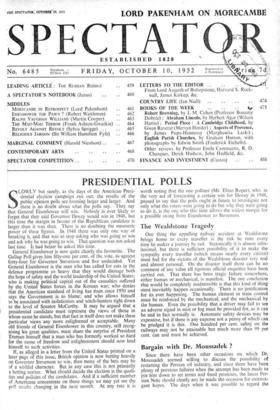PRESIDENTIAL POLLS
LOWLY but surely, as the days of the American Presi- dential election campaign run out, the results of the public opinion polls are looming larger and larger. And there is no doubt about what the polls say. They say that General Eisenhower will win. Nobody is ever likely to forget that they said Governor Dewey would win in 1948, but this time the margin in favour of the Republican candidate is larger than it was then. There is no doubting the mesmeric power of these figures. In 1948 there was only one way of breaking it, and that was to stop asking who was going to win and ask why he was going to win. That question was not asked last time. It had better be asked this time.
General Eisenhower is now quite clearly the favourite. The Gallup Poll gives him fifty-one per cent. of the vote, as against forty-four for Governor Stevenson and five undecided. Yet General Eisenhower is the man who has called for cuts in the defence programme so heavy that they would damage both the hope of safety and the world leadership of the United States; who is making political capital out of the casualties suffered by the United States forces in the Korean war; who denies that the American standard of living has risen since 1950 and says the Government is to blame; and who allows himself to be associated with isolationists and witch-hunters right down to the level of Senator McCarthy. It may be argued that a presidential candidate must represent the views of those in whose name he stands, but that fact in itself does not make these particular views any more enlightened or acceptable. Many old friends of General Eisenhower in this country, still recog- nising his great qualities, must share the surprise of President Truman himself that a man who has formerly worked so hard for the cause of freedom and enlightenment should now lend himself to such activities.
If, as alleged in a letter from the United States printed on a later page of this issue, British opinion is now betting heavily on Governor Stevenson to win, then many of the bets may be of a wishful character. But in any case this is not primarily a betting matter. What should decide the election is the quali- ties and policies of the candidates. And if a sufficient number of Americans concentrate on those things we may yet see the poll results changing in the next month. At any rate it is worth noting that the one pollster (Mr. Elmo Roper), who, in the very act of forecasting a certain win for Dewey in 1948, paused to say that the polls ought in future to investigate not only what the voters were going to do but why they were going to do it, is the one who this time allows the widest margin for a possible swing from Eisenhower to Stevenson.


































